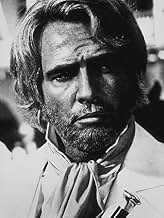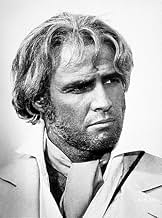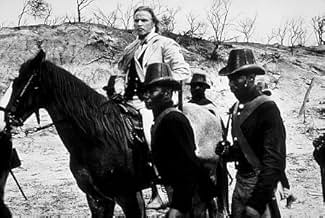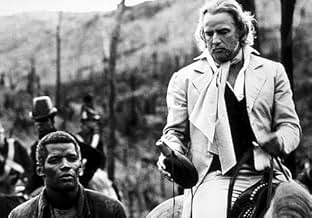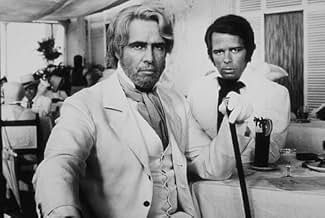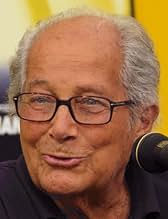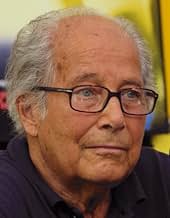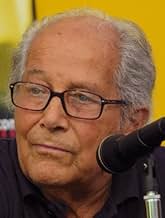Durante una rivolta degli schiavi nel 1844, un mercenario britannico aiuta un'isola coloniale delle Antille a ottenere l'indipendenza dal Portogallo. Anni dopo torna lì per cacciare all'uomo... Leggi tuttoDurante una rivolta degli schiavi nel 1844, un mercenario britannico aiuta un'isola coloniale delle Antille a ottenere l'indipendenza dal Portogallo. Anni dopo torna lì per cacciare all'uomo ed ex amico, capo dell'esercito ribelle locale.Durante una rivolta degli schiavi nel 1844, un mercenario britannico aiuta un'isola coloniale delle Antille a ottenere l'indipendenza dal Portogallo. Anni dopo torna lì per cacciare all'uomo ed ex amico, capo dell'esercito ribelle locale.
- Regia
- Sceneggiatura
- Star
- Premi
- 5 vittorie e 1 candidatura in totale
- José Dolores
- (as Evaristo Marquez)
- Juanito
- (as Joseph P. Persaud)
- Soldier
- (as Alvaro Medrano)
- Engl. Major
- (as Alejandro Obregon)
- Lady Bella
- (non citato nei titoli originali)
- Man on the ship
- (non citato nei titoli originali)
- Ramón
- (non citato nei titoli originali)
Recensioni in evidenza
Walker is sent to the island of Queimada on two occasions in furtherance of British interests in the sugar trade. Initially he is employed by the Admiralty to incite a rebellion against the Portugese and install an independent government. Ten years later he returns, this time on behalf of a major sugar company, to destroy the rebel leader he himself has created.
Walker, however, is an ambivalent figure, only too aware of the contradictions in his nature. His stance is that of the professional who tries 'to do a job well, and to see it through'. At the same time, he admires Jose Dolores, the rebel leader, and is contemptuous of those not fighting alongside him. ('Why aren't you up there with them on the Sierra Madre?' he asks a bemused government soldier.) When his successful counter-insurrection leads to Jose Dolores' capture, Walker offers him the chance to escape execution, and is then puzzled by his refusal. As a man without political conviction, Walker cannot comprehend it in others.
The film is not without its flaws. Some fairly ruthless cutting leaves the plot difficult to follow on first viewing. The middle section, accounting for the intervening years in Walker's life, is unconvincing. If he is a disillusioned man, reduced to drinking and brawling (through self-loathing?) there is no sign of it on his return to Queimada. And whatever happened to his next assignment in, ironically, Indo-China?
The rest of the multi-national cast are no match for Brando, who has most of the dialogue and is seldom off screen. Jose Dolores, for example, is played by a young Colombian who had never seen a film before, let alone acted in one, and the imbalance between the two performances is all too evident. Pontecorvo orchestrates the big crowd scenes well, and they have the documentary feel of Battle of Algiers, but they cause the film to swing unevenly between action and ideas.
Making the film was apparently an unhappy experience for all concerned. Shot mainly in Colombia, working conditions were appalling with the cast and crew subject to illness, bad weather and threats of violence. With Italian, French, English and Spanish speakers involved, there were major problems of communication. Brando and Pontecorvo had different views on the main character - the director wanted him portrayed as an unmitigated force of evil while Brando pushed for more light and shade - and relationships between the two deteriorated rapidly. Filming was finally completed in Morocco after Brando, who was at a very low ebb in his life, walked off the set and threatened to quit the production altogether.
Despite its flaws, it remains a fascinating film, with a literate script, a strong anti-racist message and a central performance of great intelligence and wit. Why has it never been released on video in the UK?
I have watched the film several times and loved Gillo Pontecorvo's direction of the scenes at the port, which are one of my favorite sequences in cinema. Pontecorvo wanted Brando to create an evil figure of "Sir" William Walker, who was a real person though not a British knight. He was an American mercenary who even went to Indo-China. Brando apparently argued with Pontecorvo that the character instead of a clear-cut evil figure should be more ambiguous and this led to major differences between the two. On viewing the film, it is evident Brando won the argument.
Franco Solinas, the screenplay writer, was a brilliant Leftist who contributed to Pontecorvo's success on "Battle of Algiers" and "Kapo." However, their films rankled the far Left and the far Right. Quiemada's script upset the Spanish government, and the filmmakers changed the details from a Spanish colony to a Portuguese colony. But Brando who probably was aware of the American connection of the lead character must have enjoyed the parallels of the story--knowing his personal love for the native Indian cause.
The film is a witty, cynical portrayal of colonial designs on impoverished poor. Sugar was the commodity in vogue then. A century later you could replace "sugar" with "oil." The film is replete with a brilliant speech penned by Solinas, spoken by Brando that begins by comparing the economics of having a wife versus a prostitute. He then ends the speech comparing the gains of a slave with that of hired labor. The political philosophy is unorthodox but hard hitting.
The visual effect of Brando's blonde hair and white clothes against the black natives is a visual metaphor. It is perhaps most anti-racist movie that I have seen with William Walker in all his glory unable to comprehend the political conviction and values of a native worker who refuses a chance to escape a cruel execution.
This film has a small but significant role for Italian actor Renato Salvatori.
I have seen hundreds of political movies--but this will remain my all time favorite. The film won Pontecorvo in 1970 the best director national award in Italy. The mix of Brando, Pontecorvo, Solinas, Salvatori and Morricone is a heady cocktail that will be a great experience for any intelligent viewer.
It is impressive the timing of director Gillo Pontecorvo to make and release "Burn!". In 1969, the South America was under military dictatorships promoted by the United States of America to improve their economical and political interests in the region. There are many parallel situations in the colonization process between what was happening in South America in that historical moment and in the fictitious island of Queimada in the previous century. Marlon Brando performs one of the most Machiavellians characters of the cinema history and very similar to the American advisors that supported the foregoing dictatorships (despite not using torture). His character is fascinating as well as his political capability to envision the consequences of his actions; he is indeed the personification of the thoughts and concepts of Machiavelli in "The Prince". My only remark is the use of English language in a Portuguese colony; Mr. Pontecorvo should have casted actors that speak Portuguese to be more accurate. My vote is eight.
Title (Brazil): "Queimada!" ("Burn!")
Lo sapevi?
- QuizMarlon Brando once said this film contains "the best acting I've ever done."
- BlooperPortugal never had any colonies in the Caribbean. Its only American colony, Brazil, has no coast in the Caribbean.
- Citazioni
Sir William Walker: Gentlemen, let me ask you a question. Now, my metaphor may seem a trifle impertinent, but I think it's very much to the point. Which do you prefer - or should I say, which do you find more convenient - a wife, or one of these mulatto girls? No, no, please don't misunderstand: I am talking strictly in terms of economics. What is the cost of the product? What is the product yield? The product, in this case, being love - uh, purely physical love, since sentiments obviously play no part in economics.
[general laughter]
Sir William Walker: Quite. Now, a wife must be provided with a home, with food, with dresses, with medical attention, etc, etc. You're obliged to keep her a whole lifetime even when she's grown old and perhaps a trifle unproductive. And then, of course, if you have the bad luck to survive her, you have to pay for the funeral!
[general laughter]
Sir William Walker: It's true, isn't it? Gentlemen, I know it's amusing, but those are the facts, aren't they? Now with a prostitute, on the other hand, it's quite a different matter, isn't it? You see, there's no need to lodge her or feed her, certainly no need to dress her or to bury her, thank God. She's yours only when you need her, you pay her only for that service, and you pay her by the hour! Which, gentlemen, is more important - and more convenient: a slave or a paid worker?
- Versioni alternativeThe complete version of this film runs 132 minutes. A 112-minute version under the title "Burn!" was released in the USA and the UK.
- ConnessioniFeatured in Pontecorvo: The Dictatorship of Truth (1992)
I più visti
- How long is Burn!?Powered by Alexa
Dettagli
- Data di uscita
- Paesi di origine
- Lingue
- Celebre anche come
- Quemada
- Luoghi delle riprese
- Aziende produttrici
- Vedi altri crediti dell’azienda su IMDbPro
Botteghino
- Lordo Stati Uniti e Canada
- 431.817 USD
- Tempo di esecuzione
- 2h 12min(132 min)
- Colore
- Proporzioni
- 1.66 : 1


